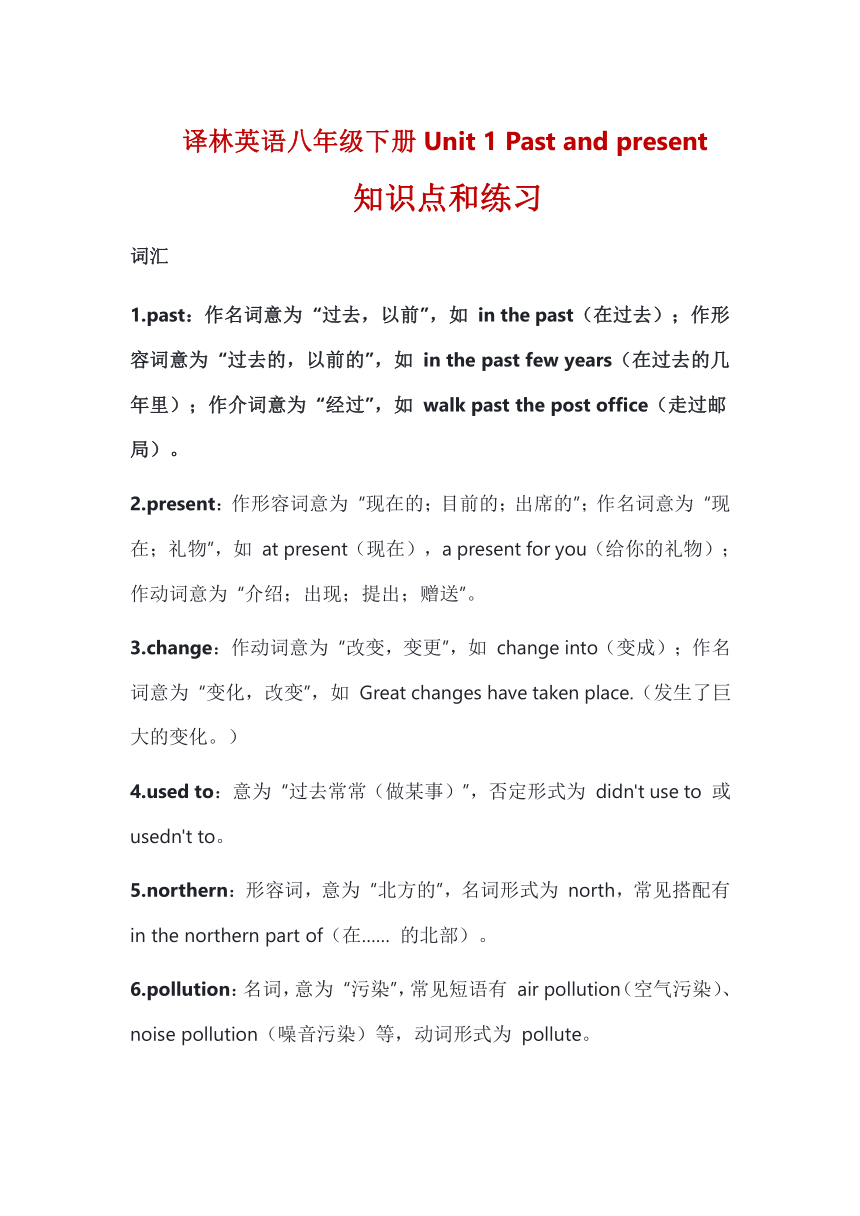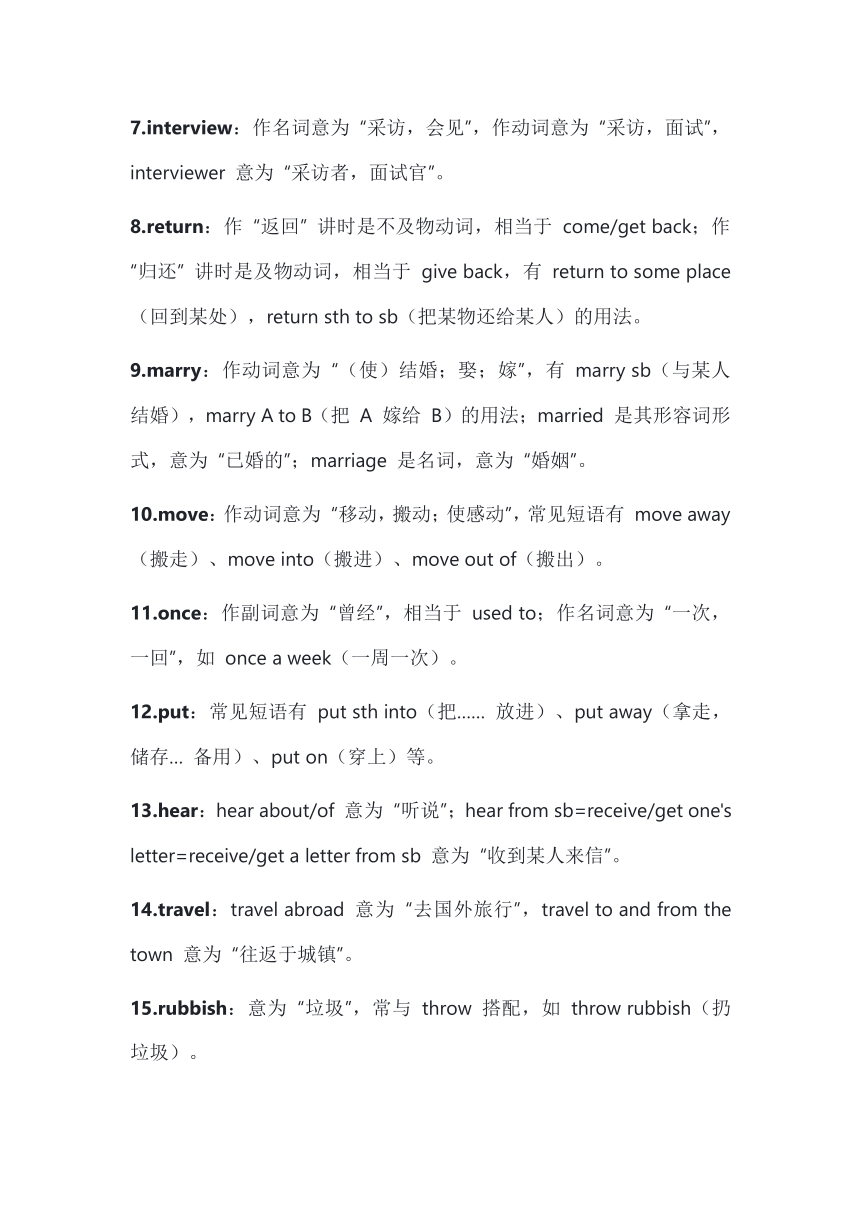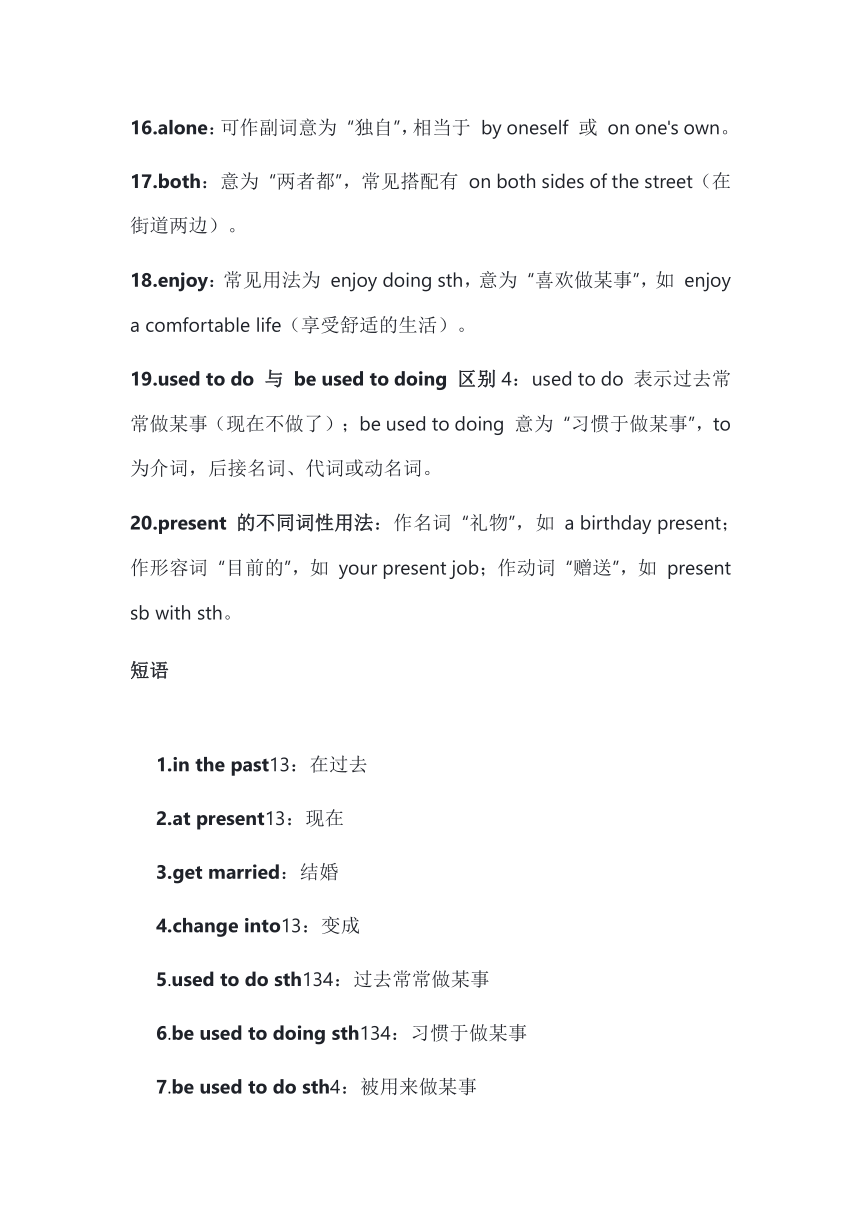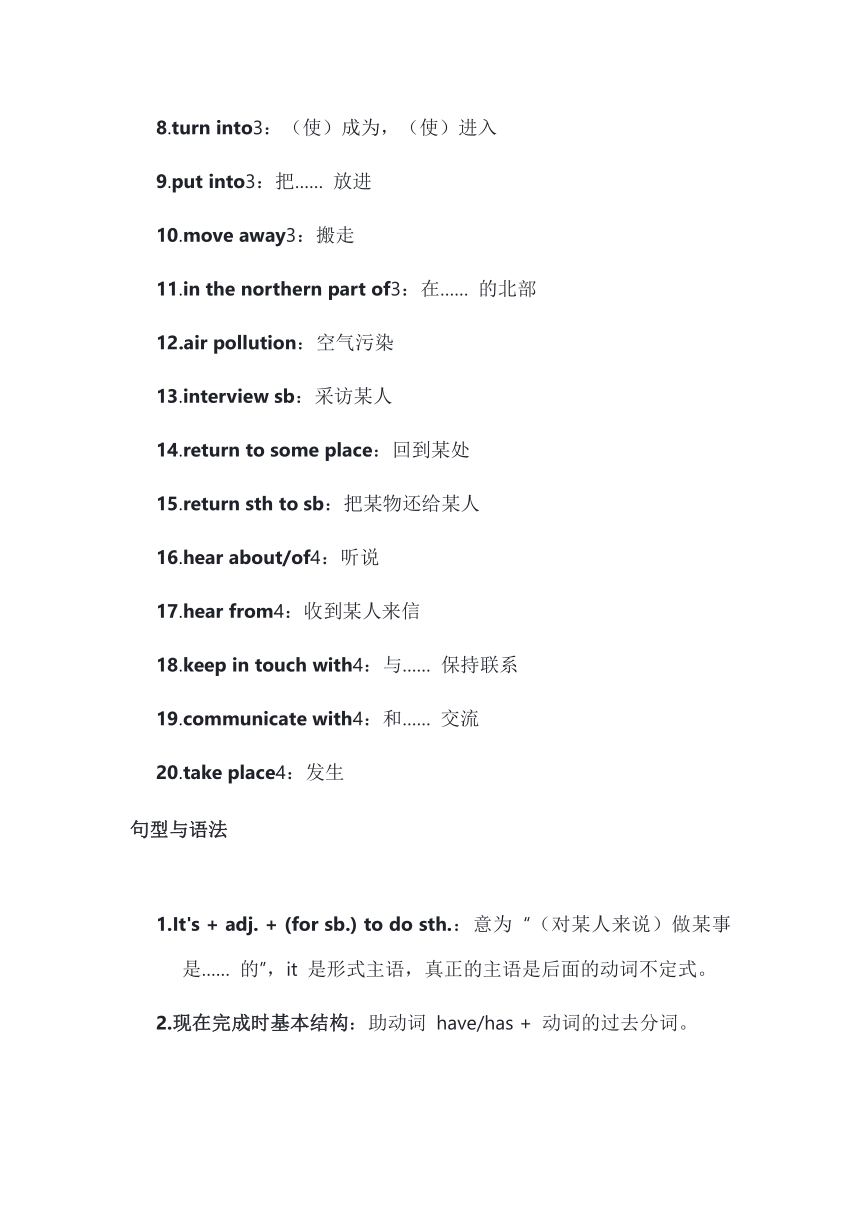Unit1 Past and Present 知识点和练习(含答案)2024-2025学年牛津译林版英语八年级下册
文档属性
| 名称 | Unit1 Past and Present 知识点和练习(含答案)2024-2025学年牛津译林版英语八年级下册 |  | |
| 格式 | docx | ||
| 文件大小 | 26.1KB | ||
| 资源类型 | 教案 | ||
| 版本资源 | 牛津译林版 | ||
| 科目 | 英语 | ||
| 更新时间 | 2025-02-17 10:31:59 | ||
图片预览





文档简介
译林英语八年级下册Unit 1 Past and present
知识点和练习
词汇
1.past:作名词意为 “过去,以前”,如 in the past(在过去);作形容词意为 “过去的,以前的”,如 in the past few years(在过去的几年里);作介词意为 “经过”,如 walk past the post office(走过邮局)。
2.present:作形容词意为 “现在的;目前的;出席的”;作名词意为 “现在;礼物”,如 at present(现在),a present for you(给你的礼物);作动词意为 “介绍;出现;提出;赠送”。
3.change:作动词意为 “改变,变更”,如 change into(变成);作名词意为 “变化,改变”,如 Great changes have taken place.(发生了巨大的变化。)
4.used to:意为 “过去常常(做某事)”,否定形式为 didn't use to 或 usedn't to。
5.northern:形容词,意为 “北方的”,名词形式为 north,常见搭配有 in the northern part of(在…… 的北部)。
6.pollution:名词,意为 “污染”,常见短语有 air pollution(空气污染)、noise pollution(噪音污染)等,动词形式为 pollute。
7.interview:作名词意为 “采访,会见”,作动词意为 “采访,面试”,interviewer 意为 “采访者,面试官”。
8.return:作 “返回” 讲时是不及物动词,相当于 come/get back;作 “归还” 讲时是及物动词,相当于 give back,有 return to some place(回到某处),return sth to sb(把某物还给某人)的用法。
9.marry:作动词意为 “(使)结婚;娶;嫁”,有 marry sb(与某人结婚),marry A to B(把 A 嫁给 B)的用法;married 是其形容词形式,意为 “已婚的”;marriage 是名词,意为 “婚姻”。
10.move:作动词意为 “移动,搬动;使感动”,常见短语有 move away(搬走)、move into(搬进)、move out of(搬出)。
11.once:作副词意为 “曾经”,相当于 used to;作名词意为 “一次,一回”,如 once a week(一周一次)。
12.put:常见短语有 put sth into(把…… 放进)、put away(拿走,储存… 备用)、put on(穿上)等。
13.hear:hear about/of 意为 “听说”;hear from sb=receive/get one's letter=receive/get a letter from sb 意为 “收到某人来信”。
14.travel:travel abroad 意为 “去国外旅行”,travel to and from the town 意为 “往返于城镇”。
15.rubbish:意为 “垃圾”,常与 throw 搭配,如 throw rubbish(扔垃圾)。
16.alone:可作副词意为 “独自”,相当于 by oneself 或 on one's own。
17.both:意为 “两者都”,常见搭配有 on both sides of the street(在街道两边)。
18.enjoy:常见用法为 enjoy doing sth,意为 “喜欢做某事”,如 enjoy a comfortable life(享受舒适的生活)。
19.used to do 与 be used to doing 区别4:used to do 表示过去常常做某事(现在不做了);be used to doing 意为 “习惯于做某事”,to 为介词,后接名词、代词或动名词。
20.present 的不同词性用法:作名词 “礼物”,如 a birthday present;作形容词 “目前的”,如 your present job;作动词 “赠送”,如 present sb with sth。
短语
1.in the past13:在过去
2.at present13:现在
3.get married:结婚
4.change into13:变成
5.used to do sth134:过去常常做某事
6.be used to doing sth134:习惯于做某事
7.be used to do sth4:被用来做某事
8.turn into3:(使)成为,(使)进入
9.put into3:把…… 放进
10.move away3:搬走
11.in the northern part of3:在…… 的北部
12.air pollution:空气污染
13.interview sb:采访某人
14.return to some place:回到某处
15.return sth to sb:把某物还给某人
16.hear about/of4:听说
17.hear from4:收到某人来信
18.keep in touch with4:与…… 保持联系
municate with4:和…… 交流
20.take place4:发生
句型与语法
1.It's + adj. + (for sb.) to do sth.:意为 “(对某人来说)做某事是…… 的”,it 是形式主语,真正的主语是后面的动词不定式。
2.现在完成时基本结构:助动词 have/has + 动词的过去分词。
3.现在完成时用法 1:表示过去发生的行为、动作或情况对现在造成的影响或结果,常与 just、already、yet 等时间副词连用。
4.现在完成时用法 2:表示从过去开始并持续到现在的行为、动作或情况,常与 for 或 since 引导的时间状语连用。
5.used to do 的一般疑问句4:Did...use to do... 或 Used...to do...
6.would like 用法 14:would like 后接名词或代词,表示 “要” 某样东西。
7.would like 用法 24:would like 后接动词不定式,表示意愿、喜爱,常用于有礼貌地提出邀请、请求或建议。
8.would like 用法 34:would like sb. to do sth. 意为 “想要某人做某事”。
9.hope 用法 14:hope 用于表示可能实现的事情,后接从句时,用陈述语气。
10.hope 用法 24:可以用 hope to do sth. 句型,但不能用 hope sb. to do sth. 句型。
译林牛津英语八年级下册第一单元基础练习
一、词汇运用
1.There have been great changes in our city. It has ____ (变成) a modern one.
2.The old man has lived here ____ (自…… 以来) 1990.
3.Have you ever ____ (曾经) been to the Great Wall
4.I haven't seen my grandparents for a long time. I ____ (想念) them very much.
5.My father has ____ (刚刚) come back from work. He is very tired.
6.The government has taken action to improve the ____ (形势).
7.They got ____ (结婚) last year. Now they are living a happy life.
8.It's ____ (不可能的) for him to finish the work in such a short time.
9.There are many ____ (工厂) in our town. They cause a lot of pollution.
10.We should protect the ____ (环境) to make our world more beautiful.
二、单项选择
—____ have you been in this school
—Since two years ago.
A. How long B. How soon C. How often D. How far
My parents have lived in the countryside ____.
A. for some time ago B. since they got married
C. after they got married D. when they got married
The old man lives ____, but he never feels ____.
A. alone; alone B. lonely; lonely C. alone; lonely D. lonely; alone
—Have you seen the film ____
—Yes, I saw it three days ____.
A. yet; ago B. already; ago C. yet; before D. already; before
The boy has ____ to do today.
A. lots of homework B. a lot of homeworks
C. a lot homework D. lots of homeworks
Great changes ____ in my hometown in the past ten years.
A. have taken place B. have been taken place
C. took place D. were taken place
I ____ my hometown for a long time. I really miss it.
A. left B. have left C. have been away from D. was away from
—____ have you known each other
—Since we were in primary school.
A. How long B. How often C. How soon D. How far
The old man used to ____ in the country, but now he is used to ____ in the city.
A. live; live B. living; living C. live; living D. living; live
It's ____ that we will never forget the 2022 Beijing Winter Olympics.
A. such an exciting event B. such exciting an event
C. so an exciting event D. so exciting event
三、用所给动词的适当形式填空
My family ____ (move) to Nanjing ten years ago.
I ____ (not see) my best friend Lucy for two months. I miss her very much.
Tom ____ (go) to the USA. He will be back in two weeks.
My father ____ (work) in this factory since he was twenty years old.
The old man ____ (live) here all his life. He knows everyone here well.
—____ you ____ (visit) the Great Wall before
—Yes, I have. I ____ (visit) it last year.
Look! The students ____ (play) football on the playground.
The film ____ (begin) ten minutes ago. You have missed the beginning.
It's the first time I ____ (see) such a beautiful flower.
We ____ (know) each other since we were children.
四、按要求完成句子
He has lived in this town for 10 years. (对划线部分提问)
____ ____ has he lived in this town
The Greens moved to France two years ago. (改为同义句)
The Greens have ____ ____ France for two years.
My father has been to Shanghai twice. (改为一般疑问句)
____ your father ____ to Shanghai twice
The boy has eaten three apples. (改为否定句)
The boy ____ ____ three apples.
He left school two years ago. (改为同义句)
He has ____ ____ from school for two years.
五、完形填空
In the past, I got up very early in the morning. I turned on the light and took out a physics book. Then I started 1 quietly. I worked so hard because I had a great 2 one day, I would be the first Chinese person to win the Nobel Prize (诺贝尔奖) in physics.
When I was eight, I became interested in physics.I first had physics 3 in Junior 2. In class, I 4 that there had never been a Nobel Prize winner of physics from China. That made me sad, 5 I decided to change it. I began to work very hard. I 6 the four famous books on physics and did thousands of exercises. I worked harder and harder. My physics teacher 7 me. And my classmates also helped me when I had problems.
After two years, I was 8 to study in a university in Russia. I was very happy. Then I 9 to work for my dream. But my dream didn't come true. I was not able to win the prize. I felt very 10 .
But I didn't give up. I kept working hard. I believe that one day my dream will come true.
A. writing B. reading C. thinking D. listening
A. dream B. idea C. plan D. work
A. lessons B. items C. subjects D. classrooms
A. joined B. learned C. studied D. listened
A. for B. but C. and D. so
A. bought B. sold C. read D. took
A. forgot B. hated C. helped D. laughed at
A. full B. able C. late D. sorry
A. remembered B. stopped C. began D. continued
A. angry B. excited C. happy D. sad
六、阅读理解
Many people like to travel by plane, but I don't like it because an airport is usually far from the city. You have to get there early and wait for hours for the plane to take off and it is often late. You can't open the windows. You can't choose the food. Planes are fast, but they still take hours to get out of the airport and into the city.
I like traveling by train. I think trains are safe. Railway stations are usually in cities. When you are late for a train, you can catch another one. You can walk around in the train and open the windows. You can see many interesting things on your way. I know it takes a little more time.
I also like cars. You can start your journey when you want to, and you don't need to get to a railway station or a bus stop. Also you can carry many things with you in a car. But sometimes there are too many cars on the road.
1.Why do many people like to travel by plane
A. Because it is fast.
B. Because it is safe.
C. Because you can walk around in the plane.
D. Because you can choose the food.
2.Which is NOT the good thing about the train
A. It is safe.
B. It takes a little more time.
C. You can open the windows.
D. You can walk around in the train.
3.If you want to take a lot of things with you, what do you take to go out
A. A bus. B. A car. C. A train. D. A plane.
4.What is the bad thing about the car
A. You needn't go to a station.
B. You can start your journey when you want to.
C. There are too many cars on the road.
D. You can carry many things.
5.What does the writer think of the plane, train and car
A. He thinks it takes a lot of time to go to and get out of the airport.
B. He likes to take a train because it takes a little more time.
C. He likes to take a car because he has a car.
D. He likes to take a plane because it is fast.
答案
一、词汇运用
1.become
2.since
3.ever
4.miss
5.just
6.situation
7.married
8.impossible
9.factories
10.environment
二、单项选择
1.A
2.B
3.C
4.A
5.A
6.A
7.C
8.A
9.C
10.A
三、用所给动词的适当形式填空
1.moved
2.haven't seen
3.has gone
4.has worked
5.has lived
6.Have; visited; visited
7.are playing
8.began
9.have seen
10.have known
四、按要求完成句子
1.How long
2.been in
3.Has; been
4.hasn't eaten
5.been away
五、完形填空
1.B
2.A
3.A
4.B
5.D
6.C
7.C
8.B
9.D
10.D
六、阅读理解
1.A
2.B
3.B
4.C
5.A
知识点和练习
词汇
1.past:作名词意为 “过去,以前”,如 in the past(在过去);作形容词意为 “过去的,以前的”,如 in the past few years(在过去的几年里);作介词意为 “经过”,如 walk past the post office(走过邮局)。
2.present:作形容词意为 “现在的;目前的;出席的”;作名词意为 “现在;礼物”,如 at present(现在),a present for you(给你的礼物);作动词意为 “介绍;出现;提出;赠送”。
3.change:作动词意为 “改变,变更”,如 change into(变成);作名词意为 “变化,改变”,如 Great changes have taken place.(发生了巨大的变化。)
4.used to:意为 “过去常常(做某事)”,否定形式为 didn't use to 或 usedn't to。
5.northern:形容词,意为 “北方的”,名词形式为 north,常见搭配有 in the northern part of(在…… 的北部)。
6.pollution:名词,意为 “污染”,常见短语有 air pollution(空气污染)、noise pollution(噪音污染)等,动词形式为 pollute。
7.interview:作名词意为 “采访,会见”,作动词意为 “采访,面试”,interviewer 意为 “采访者,面试官”。
8.return:作 “返回” 讲时是不及物动词,相当于 come/get back;作 “归还” 讲时是及物动词,相当于 give back,有 return to some place(回到某处),return sth to sb(把某物还给某人)的用法。
9.marry:作动词意为 “(使)结婚;娶;嫁”,有 marry sb(与某人结婚),marry A to B(把 A 嫁给 B)的用法;married 是其形容词形式,意为 “已婚的”;marriage 是名词,意为 “婚姻”。
10.move:作动词意为 “移动,搬动;使感动”,常见短语有 move away(搬走)、move into(搬进)、move out of(搬出)。
11.once:作副词意为 “曾经”,相当于 used to;作名词意为 “一次,一回”,如 once a week(一周一次)。
12.put:常见短语有 put sth into(把…… 放进)、put away(拿走,储存… 备用)、put on(穿上)等。
13.hear:hear about/of 意为 “听说”;hear from sb=receive/get one's letter=receive/get a letter from sb 意为 “收到某人来信”。
14.travel:travel abroad 意为 “去国外旅行”,travel to and from the town 意为 “往返于城镇”。
15.rubbish:意为 “垃圾”,常与 throw 搭配,如 throw rubbish(扔垃圾)。
16.alone:可作副词意为 “独自”,相当于 by oneself 或 on one's own。
17.both:意为 “两者都”,常见搭配有 on both sides of the street(在街道两边)。
18.enjoy:常见用法为 enjoy doing sth,意为 “喜欢做某事”,如 enjoy a comfortable life(享受舒适的生活)。
19.used to do 与 be used to doing 区别4:used to do 表示过去常常做某事(现在不做了);be used to doing 意为 “习惯于做某事”,to 为介词,后接名词、代词或动名词。
20.present 的不同词性用法:作名词 “礼物”,如 a birthday present;作形容词 “目前的”,如 your present job;作动词 “赠送”,如 present sb with sth。
短语
1.in the past13:在过去
2.at present13:现在
3.get married:结婚
4.change into13:变成
5.used to do sth134:过去常常做某事
6.be used to doing sth134:习惯于做某事
7.be used to do sth4:被用来做某事
8.turn into3:(使)成为,(使)进入
9.put into3:把…… 放进
10.move away3:搬走
11.in the northern part of3:在…… 的北部
12.air pollution:空气污染
13.interview sb:采访某人
14.return to some place:回到某处
15.return sth to sb:把某物还给某人
16.hear about/of4:听说
17.hear from4:收到某人来信
18.keep in touch with4:与…… 保持联系
municate with4:和…… 交流
20.take place4:发生
句型与语法
1.It's + adj. + (for sb.) to do sth.:意为 “(对某人来说)做某事是…… 的”,it 是形式主语,真正的主语是后面的动词不定式。
2.现在完成时基本结构:助动词 have/has + 动词的过去分词。
3.现在完成时用法 1:表示过去发生的行为、动作或情况对现在造成的影响或结果,常与 just、already、yet 等时间副词连用。
4.现在完成时用法 2:表示从过去开始并持续到现在的行为、动作或情况,常与 for 或 since 引导的时间状语连用。
5.used to do 的一般疑问句4:Did...use to do... 或 Used...to do...
6.would like 用法 14:would like 后接名词或代词,表示 “要” 某样东西。
7.would like 用法 24:would like 后接动词不定式,表示意愿、喜爱,常用于有礼貌地提出邀请、请求或建议。
8.would like 用法 34:would like sb. to do sth. 意为 “想要某人做某事”。
9.hope 用法 14:hope 用于表示可能实现的事情,后接从句时,用陈述语气。
10.hope 用法 24:可以用 hope to do sth. 句型,但不能用 hope sb. to do sth. 句型。
译林牛津英语八年级下册第一单元基础练习
一、词汇运用
1.There have been great changes in our city. It has ____ (变成) a modern one.
2.The old man has lived here ____ (自…… 以来) 1990.
3.Have you ever ____ (曾经) been to the Great Wall
4.I haven't seen my grandparents for a long time. I ____ (想念) them very much.
5.My father has ____ (刚刚) come back from work. He is very tired.
6.The government has taken action to improve the ____ (形势).
7.They got ____ (结婚) last year. Now they are living a happy life.
8.It's ____ (不可能的) for him to finish the work in such a short time.
9.There are many ____ (工厂) in our town. They cause a lot of pollution.
10.We should protect the ____ (环境) to make our world more beautiful.
二、单项选择
—____ have you been in this school
—Since two years ago.
A. How long B. How soon C. How often D. How far
My parents have lived in the countryside ____.
A. for some time ago B. since they got married
C. after they got married D. when they got married
The old man lives ____, but he never feels ____.
A. alone; alone B. lonely; lonely C. alone; lonely D. lonely; alone
—Have you seen the film ____
—Yes, I saw it three days ____.
A. yet; ago B. already; ago C. yet; before D. already; before
The boy has ____ to do today.
A. lots of homework B. a lot of homeworks
C. a lot homework D. lots of homeworks
Great changes ____ in my hometown in the past ten years.
A. have taken place B. have been taken place
C. took place D. were taken place
I ____ my hometown for a long time. I really miss it.
A. left B. have left C. have been away from D. was away from
—____ have you known each other
—Since we were in primary school.
A. How long B. How often C. How soon D. How far
The old man used to ____ in the country, but now he is used to ____ in the city.
A. live; live B. living; living C. live; living D. living; live
It's ____ that we will never forget the 2022 Beijing Winter Olympics.
A. such an exciting event B. such exciting an event
C. so an exciting event D. so exciting event
三、用所给动词的适当形式填空
My family ____ (move) to Nanjing ten years ago.
I ____ (not see) my best friend Lucy for two months. I miss her very much.
Tom ____ (go) to the USA. He will be back in two weeks.
My father ____ (work) in this factory since he was twenty years old.
The old man ____ (live) here all his life. He knows everyone here well.
—____ you ____ (visit) the Great Wall before
—Yes, I have. I ____ (visit) it last year.
Look! The students ____ (play) football on the playground.
The film ____ (begin) ten minutes ago. You have missed the beginning.
It's the first time I ____ (see) such a beautiful flower.
We ____ (know) each other since we were children.
四、按要求完成句子
He has lived in this town for 10 years. (对划线部分提问)
____ ____ has he lived in this town
The Greens moved to France two years ago. (改为同义句)
The Greens have ____ ____ France for two years.
My father has been to Shanghai twice. (改为一般疑问句)
____ your father ____ to Shanghai twice
The boy has eaten three apples. (改为否定句)
The boy ____ ____ three apples.
He left school two years ago. (改为同义句)
He has ____ ____ from school for two years.
五、完形填空
In the past, I got up very early in the morning. I turned on the light and took out a physics book. Then I started 1 quietly. I worked so hard because I had a great 2 one day, I would be the first Chinese person to win the Nobel Prize (诺贝尔奖) in physics.
When I was eight, I became interested in physics.I first had physics 3 in Junior 2. In class, I 4 that there had never been a Nobel Prize winner of physics from China. That made me sad, 5 I decided to change it. I began to work very hard. I 6 the four famous books on physics and did thousands of exercises. I worked harder and harder. My physics teacher 7 me. And my classmates also helped me when I had problems.
After two years, I was 8 to study in a university in Russia. I was very happy. Then I 9 to work for my dream. But my dream didn't come true. I was not able to win the prize. I felt very 10 .
But I didn't give up. I kept working hard. I believe that one day my dream will come true.
A. writing B. reading C. thinking D. listening
A. dream B. idea C. plan D. work
A. lessons B. items C. subjects D. classrooms
A. joined B. learned C. studied D. listened
A. for B. but C. and D. so
A. bought B. sold C. read D. took
A. forgot B. hated C. helped D. laughed at
A. full B. able C. late D. sorry
A. remembered B. stopped C. began D. continued
A. angry B. excited C. happy D. sad
六、阅读理解
Many people like to travel by plane, but I don't like it because an airport is usually far from the city. You have to get there early and wait for hours for the plane to take off and it is often late. You can't open the windows. You can't choose the food. Planes are fast, but they still take hours to get out of the airport and into the city.
I like traveling by train. I think trains are safe. Railway stations are usually in cities. When you are late for a train, you can catch another one. You can walk around in the train and open the windows. You can see many interesting things on your way. I know it takes a little more time.
I also like cars. You can start your journey when you want to, and you don't need to get to a railway station or a bus stop. Also you can carry many things with you in a car. But sometimes there are too many cars on the road.
1.Why do many people like to travel by plane
A. Because it is fast.
B. Because it is safe.
C. Because you can walk around in the plane.
D. Because you can choose the food.
2.Which is NOT the good thing about the train
A. It is safe.
B. It takes a little more time.
C. You can open the windows.
D. You can walk around in the train.
3.If you want to take a lot of things with you, what do you take to go out
A. A bus. B. A car. C. A train. D. A plane.
4.What is the bad thing about the car
A. You needn't go to a station.
B. You can start your journey when you want to.
C. There are too many cars on the road.
D. You can carry many things.
5.What does the writer think of the plane, train and car
A. He thinks it takes a lot of time to go to and get out of the airport.
B. He likes to take a train because it takes a little more time.
C. He likes to take a car because he has a car.
D. He likes to take a plane because it is fast.
答案
一、词汇运用
1.become
2.since
3.ever
4.miss
5.just
6.situation
7.married
8.impossible
9.factories
10.environment
二、单项选择
1.A
2.B
3.C
4.A
5.A
6.A
7.C
8.A
9.C
10.A
三、用所给动词的适当形式填空
1.moved
2.haven't seen
3.has gone
4.has worked
5.has lived
6.Have; visited; visited
7.are playing
8.began
9.have seen
10.have known
四、按要求完成句子
1.How long
2.been in
3.Has; been
4.hasn't eaten
5.been away
五、完形填空
1.B
2.A
3.A
4.B
5.D
6.C
7.C
8.B
9.D
10.D
六、阅读理解
1.A
2.B
3.B
4.C
5.A
